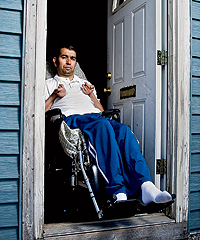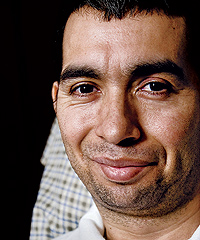
Jesus Trujillo at home |
It’s five in the morning on November 5, 2007, but, as usual, the emergency department at Stroger Cook County Hospital is jammed, filled with scores of patients suffering from cancer, heart attacks, and other bad things. When I’m called down to see him, all I know is that Jesus Trujillo is a 38-year-old man with fever and abdominal pain in bed 25. When I arrive, he isn’t there—they just took him to CT scan—but a beautiful young woman is. (She’s his wife, the ED nurse explains.) Asleep on a chair, her long, lustrous hair tumbling toward the floor, she looks like my daughter. As I walk to CT, I hope that my Caitie never has to spend the night in a place like this.
The CT technician is working solo (another victim of the budget cuts), and even if she hadn’t been up all night she would never be able to get Jesus into the CT scanner alone. Jesus (that’s “Hey, Zeus” for those of you whose command of Spanish is as poor as mine) tries to help but he can’t. He’s been paralyzed for 12 months now, but, as he tells me later, he still forgets sometimes, surprised all over again when he can’t move his arms or legs. The tech and I hoist him onto the CT table, careful not to pull out his bladder catheter or IV lines. I lift his elbows up high and hold them there, dead weight, as the tech binds them one to the other with long strips of tape so his floppy arms can’t get in the way of the x-rays. Lying in the CT scanner, crucified with tape, Jesus looks like the butt of some cruel practical joke.
The CT scan shows stones obstructing Jesus’s left kidney, which looks swollen and infected. His computerized medical record (one of the many wonderful advances in the new County Hospital) shows that Jesus has been here once before, a year ago, when the cops brought him in with a bullet in his neck. From his record now, it is clear that our trauma team worked one of its miracles back then; certainly, they saved Jesus’s life. After three desperate weeks, he was transferred to Oak Forest Hospital, where he received top-notch rehabilitation services before being discharged home to his family in the Back of the Yards neighborhood. It’s a familiar story at County, outstanding care for the toughest cases, the ones the other hospitals don’t want. In the old County, we had a whole ward filled with young men paralyzed from the neck down. (In the gang wars, a neck shot was the ultimate revenge, a fate worse than death.) God only knows where these guys are now, who bathes them, feeds them, cleans them up. But today Jesus is here and we can help, so we wheel him upstairs to treat his infected kidney.

Back of the Yards resident Trujillo: “I was a soccer player, you know? I used to teach all the kids in the neighborhood how to play.” |
Twelve hours later, Jesus is much worse. He’s lost his blood pressure and his pulse is wicked fast. He’s still conscious, but barely. His wife, who hasn’t left his side, is terrified. The surgeons come running, ready to operate on Jesus’s kidney, but he is too sick even for emergency surgery. We hustle him down to the ICU, where our critical care team works feverishly to get his blood pressure back. In the middle of the night, our interventional radiologists put a tube into Jesus’s kidney to drain out the pus, watching on the CT scan to make sure they get it right. Afterwards, Jesus is still very sick, but now we know he’ll make it. Around dawn, he even cracks a few jokes; his wife and brothers laugh and cry and shake their heads. We tell them to go home for a while—get some rest; you’ll need it.
Maybe it’s the way they all look at him, or how each kisses him goodbye, that makes me wonder. I assumed I knew who Jesus was and how he got this way. Now I’m not so sure. When his wife and family leave, I ask, How did you get shot, Jesus?
He raises an eyebrow, one of the few things he can still move. Then he nods, as if deciding something.
It was early in the morning, he says. I got in my car to go to work. A guy bangs on the window with a gun and says get out of the car. He takes my wallet, my iPod, my cell phone. He puts the gun in my back and makes me walk toward my building. He says, Show me where you live.
Jesus shrugs. A sad smile flits across his face.
Doc, my family is in my house. My wife, my kids. My daughter, she’s 11 years old. I can’t bring this guy in my house. I say, I can’t show you my house, man.
You know what this guy says, Doc? He says, I don’t care. He says, Somebody killed my daughter too. Now show me your house. He hits me with the gun, knocks me down. He says, Now you gonna show me your house?
 |
What do I do, Doc? I can’t show him my house. So I beg him. I tell him he has my money and my phone, my car, everything. Please, I got nothing more, man. Then the guy sticks the gun in my face. You ever had a gun in your face, Doc? Makes you think, you know? I say, Please, I can’t show you my house, man. I start to back up a little bit, real slow, you know? But he stays with me, the gun in my face. I say, Please, man, and I start to move away again, real slow. Real slow.
Jesus pauses, remembering. So that’s how I got shot, Doc.
His voice is flat, matter-of-fact. He doesn’t sound depressed or angry. He did what he had to do. And he would do it again.
I ask him how he manages now, how he provides for his family.
I had a good job, Doc, at a box factory. But my disability pay, now it ran out. So, I don’t know. I have many friends. I was a soccer player, you know? I used to teach all the kids in the neighborhood how to play. Their parents, they are my friends. But I don’t know.
Jesus got better and went home. He came back recently to have his kidney stones removed. That went well, too, but I’m not telling you this story to sing the praises of County Hospital. (Not that it would hurt taxpayers to know that the hundreds of thousands of people who go there get damned good care at a fraction of what it would cost anywhere else.) I’m telling you this story because I think more people should know about Jesus, who did the finest thing any human being can do. When I ask myself if I would have the guts to do what he did, I don’t know. I hope so. (Can it be? To hope for such a thing?) I feel like I owe him, like maybe we all owe him.
* * *
Monique Bond, a spokeswoman for the Chicago Police Department, confirms that on October 16, 2006, Jesus Trujillo was accosted, robbed, and shot in the neck on West 47th Street after refusing to lead his assailant to his home. She adds that the case currently is “suspended pending leads.”
Film: Uji Films
Photography: Joe C. Moreno


